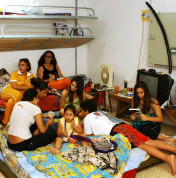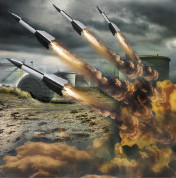HOW WILL YOU KNOW WHAT TO DO?
A guide for preparing your family and home for crisis and emergency situations

Dear residents,
Are we really prepared for natural disaster or a state of emergency?
Over the last decade, Haifa Municipality underwent a dramatic change, and today we are among the world's leaders in this field.
During those years we have accumulated abundant knowledge, and we wish to share it with you by means of this brochure, which will aid you in preparing your families and homes.
It is important to remember that the way we perform as citizens is not meant to replace the work of the rescue services, the armed forces or the governmental and municipal systems who are assigned to do that.
And yet, having the security forces combining efforts with the citizens can lead to the optimal and most correct way of action when confronting extreme or trying events.
And just as we at the Haifa Municipality, together with the rescue and security forces, constantly hold drills, the citizens also bear the responsibility to take interest, to learn and to be prepared.
I wish us all peaceful days, and may we never come to need these precautions.
Yours, Yona Yahav, Mayor
5 TIPS THAT WILL HELP YOU KNOW WHAT TO DO

1. Download the app Haifa at Your Fingertip
to receive instructions during emergency (push notifications to the cellular)2. Stock up with basic foodstuff:
2-3 six-packs of mineral water, dry ready to eat food in sealed packaging (canned food, snacks, baby food)3. Prepare equipment for long power failures:
- Charged emergency lights
- Flashlight with extra batteries
- Means of communication for continuous updates – battery-operated radio (with extra batteries) and available media utilities: TV, computer etc.
- A cell phone with a portable charger and backup batteries
- A supply of medications and a first aid kit
- Common nylon rolls (for sealing shattered windows)
- Prepare the apartment's protected space (Mamad) and/or common shelters, whichever is safer
4. Prepare equipment in case of an earthquake:
- A bag with a few days' worth of personal stuff
- A phone list of family members and emergency services
- Photocopies of important medical documents and IDs
5. During emergency leave only one cellular phone on
The batteries of the other phones will serve you in case of a long power failure. Save the cellular phones' batteries for when needed – now is the time for board gamesPREPARE YOUR HOME AND FAMILY FOR EMERGENCY

Choose beforehand a meeting spot and a contact for the family, away from the area of the occurrence
Learn first aid and keep a first aid kit at home
Prepare family emergency kits including:
- Means of communication: battery operated radio/TV/computer with internet access
- A supply of medications and a first aid kit
- Credit card details + cash
- Spare keys for car and home
- A can opener
- A whistle (to call for help)
- Flashlight and batteries/emergency light
- Candles and matches/a lighter
- A cellular phone with a charger
- Items of emotional value
- Foodstuff in sealed packages, such as canned food and snacks
- Water – 4 liters per person per day (prepare for 3 days)
- Essential documents (keeping copies out of the house is recommended, including on digital media):
- Photocopies of Kupat Cholim cards
- Photocopies of IDs, including driver's license
- Prescriptions for chronic medications
- A list of contacts and important telephone numbers
It is also recommended that each family member will have a personal bag containing:
- A change of clothes/underwear
- Shoes
- Hygienic products
- A multi-purpose knife
Bear in mind your family's unique needs:
- Baby food and supplies
- Games and magazines
- Pet food
- Books and toys
Before leaving home:
- Switch off main electricity switch
- Turn off gas
- Turn off water
- Lock the house
PREPARING THE PROTECTED SPACE

Recommended equipment for apartment/common floor protected space:
- Means of communication: battery-operated radio/computer with internet access
- Flashlight and batteries/emergency light
- Fire extinguisher
- Items that will pleasantly while away the time: games, magazines etc.
- Sealing: nylon rolls for shattered windows
- Family emergency kit (see above)
Common shelter – required equipment:
- Functioning lighting, including emergency lights
- Functioning toilets, running water and a proper water container
- No unnecessary clutter
- Sitting utilities
Preparing and keeping the shelter in order:
House committee's responsibility – Keeping and maintaining the common shelter to be used in case of an attackHaifa Municipality's responsibility – Keeping and maintaining the city's public shelters in fine order. If necessary, the City will also help to enforce keeping of common shelters in working order
HOW WILL YOU KNOW WHAT TO DO DURING AN EARTHQUAKE?

Preparation of home and family:
Most injuries during an earthquake are caused by collapsing shelves and heavy objects, glass shards, fires and gas leaks. Therefore:- Secure bookcases, TVs, furniture and shelves to the walls
- Make sure the following item are firmly secured:
- Solar and electric water tanks, gas cylinders, air conditioners and their compressors
- Store poisonous and flammable substances away from heat, in a locked place
- Position heavy items on low surfaces
- Train the family to be prepared for earthquakes
- Show the kids where the emergency exits, electricity switches, gas and water faucets are
- Determine a meeting spot for when the need for one arises.
While in the building:
If you find yourself inside a building during an earthquake, move quickly to a safe place, according to the following priority:- An open area – if possible, quickly out to an open space (in few seconds!)
- Protected space (Mamad) or stairwell – if it's impossible to immediately exit, move swiftly into your Mamad; do not shut the door. When no Mamad is available, exit to the stairwell, and if possible proceed onward to the exit and steer clear of any building
- Under a table or in a room's inner corner – if the previous instructions cannot be followed, duck for cover under a heavy piece of furniture, or sit on the floor against an inner wall and use your arms to protect the head and face. If in a wheelchair, lock the wheels and protect your head!
Instructions for people in open areas:
An open area is the safest place to be!- Stay in the open and far away as possible from buildings/pylons
- Beware of falling objects (masonry, air condition compressors, glass shards, snapped power lines etc.)
Instructions for people in vehicles:
- Come to a safe stop and remain in the car until the tremor is over – the car protects you!
- Avoid stopping under or on a bridge, in an interchange, near structures, at the bottom of a steep slope, or next to pylons
Proper behavior after an earthquake:
- Do not light fire or turn on a switch of any kind (including use of cell phones) for fear of explosion as a result of a gas leak
- Get out of the building and remain in an open area, away from buildings
- Prior to exiting the building shut gas taps and the flat's mains
- Renewal of electricity and gas supply will be performed only by a qualified technician
- Do not enter damaged buildings unless reentrance was approved by a structural engineer (unless for rescue purposes)
- Listen to the media for information and instructions
- Be prepared for aftershocks These occur minutes or days after the quake, and might collapse buildings weakened by the first tremor
Trapped under rubble:
- If there are people trapped under the debris in your proximity, judiciously use available resources for lifting heavy items, such as car jacks or iron rods
- If possible, administer first aid
- If trapped under rubble, try to extricate yourself
- Cover your respiratory system with a clothing item to protect from the dust, and avoid exhausting yourself with shouts
- Tap on piping or walls or blow a whistle to enable rescuers to locate your position
- Do not light fire
HOW WILL YOU KNOW WHAT TO DO DURING A MISSILE ATTACK?

Defense against missiles and rockets
Attention! Upon hearing the air raid siren in Haifa one has to reach a shelter in 60 seconds!Warning areas in Haifa:
Haifa – Haifa 75 | Kiryat Haim and Shmuel – Haifa 70Instructions for choosing a protected space:
The protected space will be chosen according to the time one has (60 seconds) from the moment the siren sounds, according to this priority:1. The apartment's protected space (Mamad) or the common floor space (Mamak): are the preferable choice; get in, shut the windows and doors
2. Shelter: In a building – as long as it is located inside the building and is reachable via an internal staircase regardless of warning time Public shelter – provided it can be reached within the required time after the siren sounds
3. Internal stairwell: Inhabitants of the upper floor in a building of three stories or more that has no Mamad, Mamak or inner shelter, will descend two floors and remain in the stairwell. Inhabitants of the upper floor in a three storied building that has no Mamad, Mamak or inner shelter, will descend one floor and remain in the stairwell
4. In case there is no Mamad, Mamak, shelter or inner stairwell: Chose an inner room with minimum external walls, windows and apertures, or chose a bathroom or restroom, steer clear of ceramics, china and glass, all of which might shatter. Do not stay in a building's entrance lobby, as there is risk of shrapnel and blast waves from missiles falling nearby. In case of emergency, leave front door open for the benefit of people caught outside
Outside of a building:
- In a built-up area – get into a building and act according to relevant instructions
- In an open area – lie flat on your belly on the ground and protect your head with the hands
In a vehicle:
- Pull up safely and cautiously to the side of the road
- Get out of the vehicle and enter nearest building or shelter
- In case shelter can't be reached – lie flat on the ground on your belly and cover your head with the hands
Important: Home Front Command telephone service center: 104
HOW WILL YOU KNOW WHAT TO DO IN CASE OF A FIRE?

How to act when a fire breaks:
1. Alert firefighters as soon as possible (102 from any phone)2. Try to extinguish the fire right when spotted by available resources (extinguisher, water hose, bucket, wet rag or whatever other suitable means)
3. Remove from the area any materials that might help the fire spread
4. Make sure all family members have evacuated the place and are not trapped
5. Set a meeting spot for the family in case of emergency
6. If fire spreads out of your control, leave the place, close the door behind you and tell the neighbors to evacuate the building and stay far from the fire
7. If trapped in a building and the smoke outside the room is too thick for you to get out, stay where you are and crouch, seal all cracks in the doors and close all windows (actions meant to avoid smoke penetrating from within the building or from without)
8. Check to see if no billowing smoke is seen from one of the exterior windows and if so open it to allow fresh air to enter (do not open a window if there's fear that smoke can reach it)
9. Try to make your whereabouts known immediately
HOW WILL YOU KNOW WHAT TO DO WHEN HAZARDOUS MATERIALS LEAK?

During an incident:
- Get indoors and immediately shut the apartment's exterior windows and doors
- Turn off heating and cooking stoves, turn off air conditioners, shut air vents of any kind, and turn off water and gas supply
- Enter the protected space. Close doors and windows and seal other apertures as thoroughly as possible. It is recommended not to heat the room; smoking or lighting a fire are strictly prohibited
- When outside – immediately enter the nearest available closed space
- When in a vehicle – immediately close the windows, doors and air vents (air condition included), and drive away from the area safely, via routes specified in the media
- If symptoms of exposure to hazardous materials manifest – such as queasiness, headaches, shortness of breath, skin burns or eyes and nose irritation – wash the irritated part and report to medical agents
- Listen to instructions published in the media and act accordingly
- Once the incident is over, ventilate the house well
HOW WILL YOU KNOW HOW TO SUPPLY MENTAL FIRST AID IN PRESSURE SITUATIONS?

It is preferable to avoid unnecessary tension in extreme situations
Stop and check: "frightening or dangerous?" – are you now in a dangerous situation, or just feeling fear? This is what to do to assuage the fear:Offer human warmth and attend to basic needs:
Restore and maintain order:
Look for up-to-date reliable information:
Enhance the sense of belonging:
Encourage activity:
Contacts


